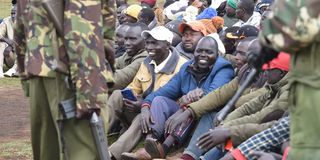Ng’arwa Kalya: Weekly community service disarming bandits in the North

Members of the public at a security meeting at Kalya at the border of West Pokot and Elgeyo Marakwet counties.
What you need to know:
- The youth clear bushes in hot spot areas where bandits hide, rivers, roads, and furrows during drought.
- Held every Tuesday, the exercise keeps the youth busy and away from retrogressive practices of banditry and cattle rustling.
On a sunny Tuesday in July, youths are clearing bushes on the desolate dreaded hilly valleys of Kaben escarpment in Tot division, Kerio Valley in Elgeyo Marakwet County.
There is calmness with groups of busy youth armed with slashers, spades, pangas, and other tools.
This is a weekly community service called Ng’arwa Kalya, meaning clearing for peace. The volunteer project initiated by locals attracts hundreds of youths who turn up to serve their community.
Held every Tuesday, the exercise keeps the youth busy and away from retrogressive practices of banditry and cattle rustling.
For decades, the Kaben area that borders Chesegon, Cheptulel, Chepkoghkogh in West Pokot, and Ngoron ward in Tiaty sub-County, Baringo has been making headlines over rampant attacks.
But the programme has boosted peace in the troubled region.
Among the villages benefiting from the programme are Vikatilit, Kakisoo, Mung’wo, and Kobil, on the upland section, northwest of Kerio Valley. To the east (towards Kerio Valley) are the Bororwo, Kitony, Ng’achar, Cheptokou, Sambalat, Liter, and Chesegon areas.
The youth clear bushes in hot spot areas where bandits hide, rivers, roads, and furrows during drought.
Also Read: Why there are no matatus, buses in Kapedo
The exercise that starts at 10 am is monitored by area chiefs, their assistants, and village elders who pioneer the youths in changing the narrative of insecurity in the troubled Kerio Valley region.
Kaben Location Chief Kirionon Tarus says the programme that began this year has started bearing fruits as attacks and cattle rustling activities have drastically reduced in the area.
“The attacks made farmers abandon their farmlands, homes, and deserted schools. This move has brought peace, unity and joy among local communities,” he says, noting that young men are targeted in the transformation initiative.
Mr Tarus, who spearheaded the initiative, says it has attracted more than 700 youths in 13 groups of 56 people.
“After work, youths socialise and share experiences in volunteering. The thick bushes had provided hideouts for armed robbers, and other physical obstacles restricted movement,” he says.
At first, youths used to contribute food for lunch but recently, they got a food donation from the county commissioner’s office.
“We received beans and looked for maize, the young men are served githeri after work. It encourages youth to be resilient in all aspects of life and actively create a just, peaceful, and equal society through formal and informal structures," he points out.
After work, the groups have dialogue and local administrators speak to them about peacebuilding.
“The programme has also helped reduce crime, alcoholism, and drug abuse among the youth,” says Mr Tarus.
He says participating in community work is compulsory for the youth, unless absent with an apology.
“They should not work on their farms on that day, unless they have an important task,” says the chief.
Mr Tarus says that youth who miss the exercise are punished by caning or a Sh500 penalty which goes into buying food for their colleagues.
“The community mobiliser looks for them and disciplines those who don’t work,” he says.
A reformed warrior, Benedict Sumai, says that the programme has helped open up the area that has been a bandits' hideout.
“Many people are always kidnapped in the bushes and even killed in the process,” he alludes, noting that the project helps to reduce idleness among youths who are unemployed in the area.
Gilbert Ruto says that bandits used to hide in bushes and caves and stage attacks.
He says many forests and bushes are occupied by criminal elements that have been terrorising the people in the area.
“The bushes are not safer, haven occupied by criminal elements and turned into places for torture, killing, maiming, rape, and all manners of evil activities,” he says.
He calls on the two governors of Elgeyo Marakwet and West Pokot counties to take it as an emergency to sanitise forests and bushes in their areas by clearing and turning them into useful places.
“To some people, it is just coming to light but we have lived with this terror for a long time. But hopefully, this is the start of the lasting solution to the menace,” he says.
Mr Ruto says many criminals have begun making peace with local communities to avert a counter-offensive against them.
Ann Kilimo, a resident of Liter, says the programme has helped promote peace in the region. “We can now move freely without fearing bandits hiding in bushes.”





